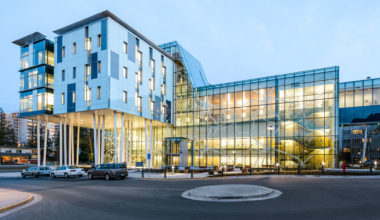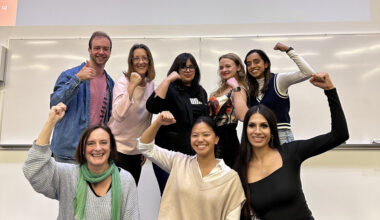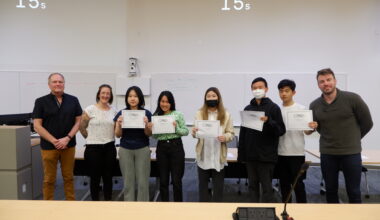Pictured above from left to right: Dr. Jacqueline Quandt, Lhyanne Soto, Irene Zhang, Eddy Zhou, Dilni Dissanagake, Yixuan (Shine) Wu, Vera Go and Dr. Tim O’ Connor.
UBC hosted the 16th Annual Vancouver Brain Bee on Saturday, April 6th , where 42 local high schoolers participated in the regional competition at the Djavad Mowafaghian Centre for Brain Health. The Brain Bee is a Spelling Bee styled neuroscience competition testing high school students from grades 9 through 12 on their knowledge of the brain and nervous system, prompting investigation and friendly competition. Students are encouraged to study research topics like memory, intelligence, emotion, perception, stress, aging, neurotransmitters, genetics and more.
The Brain Bee is held in 30 countries worldwide, with local, national and international competitions. In Vancouver, the Brain Bee is sponsored by the UBC Life Sciences Institute, DMCBH, Canadian Institutes of Health Research and the UBC Graduate Program of Neuroscience.
The event included an opening presentation delivered by Dr. Shernaz Bamji, exposure to neuroscience research laboratories, interactive demonstrations, and connections with like-minded students.



The top five competitors of the Brain Bee this year were Irene Zhang (1st place), Eddy Zhou (2nd place), Dilni Dissanagake (3rd place), Vera Go (4th place) and Yixuan (Shine) Wu (5th place).
Participating in the Brain Bee proved to be one of the most rewarding and enriching experiences Irene has had as a student.
“Although intense,” Irene says, “I loved every step of the journey, from studying various aspects of the brain to ultimately competing at UBC.”
She reports that the lab tours were especially exciting, as she had the opportunity to observe research projects and cutting-edge technology.



Irene continued to compete in Phase 1 of the National Brain Bee, before which Dr. Claudia Krebs helped her prepare with a neuroanatomy demo. She refers to this as the most memorable moment of her experience.

“Seeing a real human brain for the first time was a highlight, to say the least, and it felt so surreal!” Irene enthuses. “And after watching Dr. Krebs’s Neuroanatomy lectures on YouTube, I was definitely awestruck.”
Last summer, Irene was introduced to neuroscience through a virtual program, which served as her initial exposure to the field. Looking back, much of her fascination with neuroscience can be attributed to her background in dance.
From left to right: Dr. Jacqueline Quandt, Lhyanne Soto, Irene Zhang, and Dr. Tim O’Connor.
“Having done dance from a young age, I was always curious about how the brain responds to music and controls movement and the science behind our emotions and behaviours,” she reflects.
Irene is particularly passionate about neurodegenerative diseases, neuroplasticity and neuro-oncology. She mentions the prevalence and broad reach of neurodegenerative disorders such as Alzheimer’s, contemplating how it has indirectly affected many of our lives at some point. In addition, she is fascinated by the brain’s extraordinary ability to adapt to external and internal stimuli by changing certain networks.
“Above all, the relevance of neuroscience in our everyday lives and the potential it holds is what excites me most,” she states.
Irene hopes to one day pursue research, as it has always been so exciting to her with its innovative and exploratory nature. Although she is not set on a specific field yet, she is confident that neuroscience will be in her future.
“Throughout this entire experience, something I really loved was all the connections I was able to make,” says Irene. “From like-minded peers to distinguished professors and UBC students, everyone was so welcoming and supportive, and it was amazing to engage with so many perspectives.”
In reflecting on her experience this year, Irene emphasizes the tremendous value of participating in the competition. Exploring various post-secondary career paths and touring an active research facility provided invaluable insights. Irene believes that any student interested in neuroscience or related fields would find such an experience highly beneficial.


